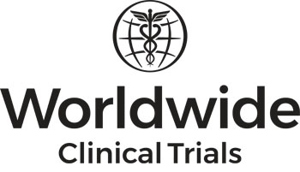Worldwide Clinical Trials
Mary Gelovich
600 Park Offices Drive Suite 200Research Triangle Park, NC 27709 US
919-674-2900

Company Overview
Worldwide Clinical Trials (Worldwide) is a leading global contract research organization (CRO) that works in partnership with biotechnology and pharmaceutical companies to create customized solutions that advance new medications, from discovery to reality. Our full-service clinical development capabilities include bioanalytical laboratory services and Phase I-IV clinical trials, as well as post-approval and real-world evidence studies – all powered by our talented and accessible team of clinicians, scientists, and researchers who bring their first-hand expertise to each clinical program.
